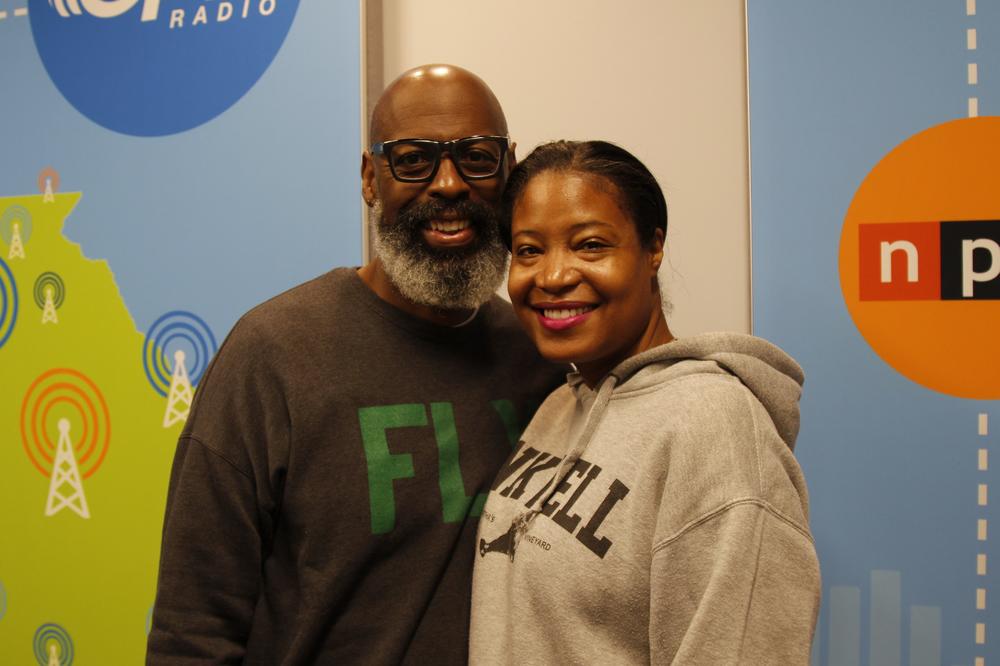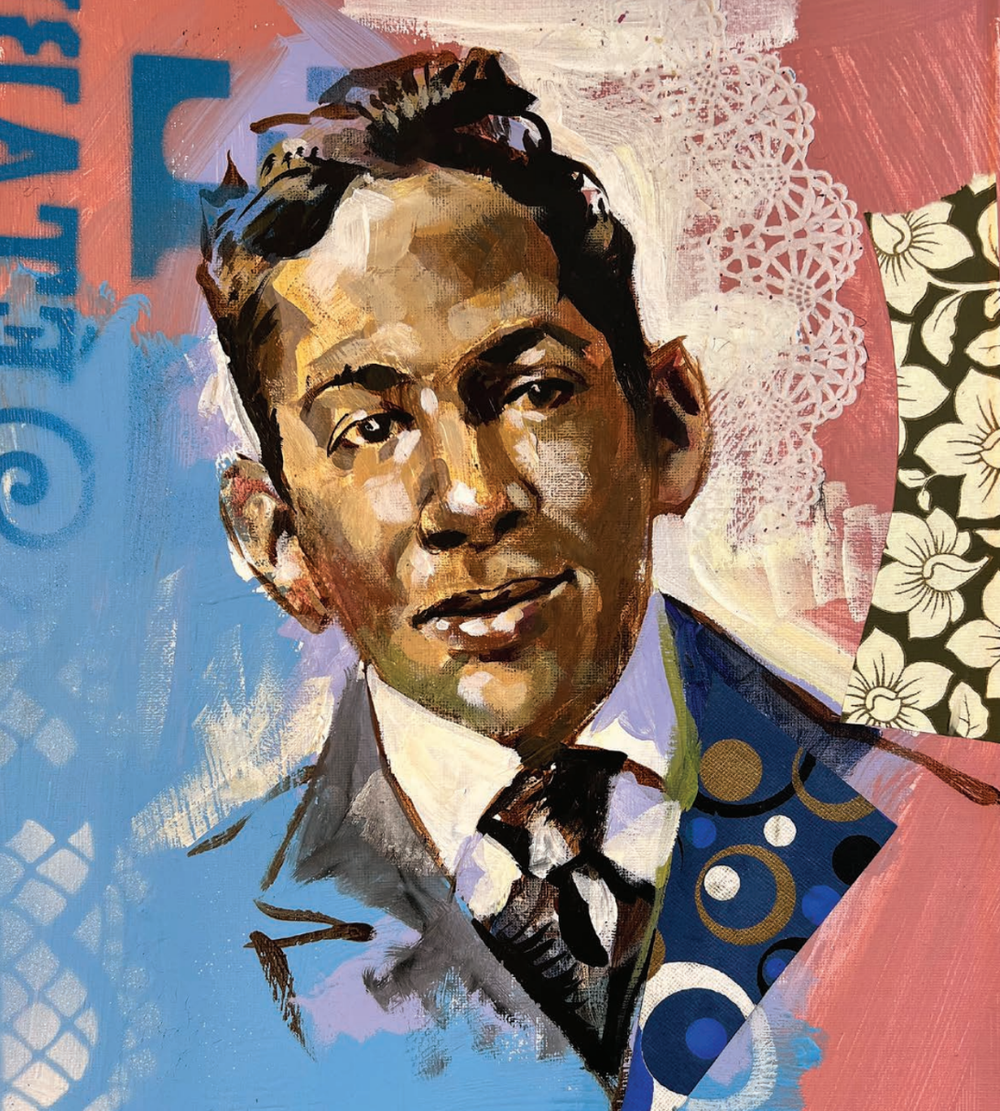
Section Branding
Header Content
Georgia Today: SE Georgia electric vehicles; Coffee reacts to Powell plea; Boats endanger whales
Primary Content
On the Monday, Oct. 23 edition of Georgia Today: Southeast Georgia is getting another large investment in electric vehicle manufacturing; Coffee County residents take the latest news in the 2020 election interference case in stride, despite being near the epicenter of the scandal; and speeding boats threaten endangered whales off the East Coast.

Peter Biello: Welcome to the Georgia Today podcast from GPB News. Today is Monday, Oct. 23. I'm Peter Biello. On today's episode, Southeast Georgia is getting another large investment in electric vehicle manufacturing. Coffee County residents take the latest news in the 2020 election interference case in stride, despite being near the epicenter of the scandal. And speeding boats threaten endangered whales off the East Coast. These stories and more are coming up on this edition of Georgia Today.
Story 1:
Peter Biello: Southeast Georgia has landed another large manufacturing facility to supply parts for an electric vehicle plant being built in Bryan County. Daechang Seat Corporation said today that they plan to invest $72 million in the region and hire 500 workers. Daechang is the latest manufacturer to announce a new plant to supply a $7 billion facility that Hyundai is building just west of Savannah.
Story 2:
State transportation officials have added two new highways to their list of planned locations for electric vehicle charging stations. State Transportation Commissioner Russell McMurry says the state has received $130 million in federal grants to build the stations. After they're complete along interstate highways, they'll be put on for non interstate corridors. Two previously announced for U.S. highways for 41 from Dublin to Cornelia and U.S. Highway 82 from Albany to Brunswick. McMurry said last week the state also would build corridors on U.S. Highway 27, along the state's western edge and U.S. Highway 76 along the state's northern edge.
Story 3:
Peter Biello: The election for Athens-Clarke County district attorney is more than a year away, but the embattled incumbent already has opposition. It's not the only challenge facing DA Deborah Gonzalez. A lawsuit filed this year by an Athens business owner alleges a raft of performance issues in her office and says she is unable and unwilling to perform her duties. She's also the target of Republican state lawmakers who passed a law creating a commission that could remove her and other elected prosecutors from office. And now former county prosecutor Kalki Yalamanchili says he's running to replace her.
Kalki Yalamanchili: There's a failure to hold violent offenders accountable, and that's leading to a situation in which there's not justice in our community.
Peter Biello: In a statement, Gonzalez told GPB she remains focused on serving the people and will not be distracted by detractors.

Story 4:
Peter Biello: Donald Trump and his allies tried many ways to overturn his 2020 defeat in Georgia. They failed. Now, two of those allies pleaded guilty last week. That includes Sidney Powell, the attorney who coordinated a plan to unlawfully copy data from voting equipment in Coffee County. But as GPB's Stephen Fowler reports, people there have largely moved on from the scandal.
Stephen Fowler: It's the middle of the afternoon on a Wednesday, and Coffee County election supervisor Christy Nipper is calm and relaxed. Voters occasionally call with questions about upcoming local elections. Everything else is:
Christy Nipper: Business as usual.
Stephen Fowler: That might not seem remarkable now, but it's a big deal to a county that was thrust into the limelight after the 2020 election — and not for a good reason.
Scott Hall: We scanned every freaking ballot and the elections director and her assistant lost their job.
Stephen Fowler: That's Scott Hall, an Atlanta area bail bondsman. On Jan. 7, 2021, Hall and several others just walked into the Coffee County Elections Office and got to work illegally copying everything they could. They hope to find proof that irregularities tainted the election outcome. They were helped by the election supervisor at the time, Misty Hampton. She later resigned. It's been two and-a-half years. There was no fraud. And much like the trains that run frequently outside the elections office, everyone in Coffee County seems eager to move on. Full steam ahead, says Nipper.
Christy Nipper: There's really nothing to be concerned about any longer. No one that was involved in that is currently here anymore. We have made changes. We have all-new people, all-new equipment.
Stephen Fowler: Beyond new equipment, there's also a new office space with a bigger window for people to legally watch the election processes unfold. Even so, there's little public attention paid to the breach, the criminal charges or the guilty pleas that are trickling in.
Judy Worrell: No one around here would have ever thought this, you know, this would happen in Coffee County.
Stephen Fowler: Sitting in a coffee shop, retired teacher Judy Worrell is one of just a handful of residents who have shared lingering concerns about the breach at public meetings.
Judy Worrell: This only happened — these kind of things happen in the big cities. You read about this in the newspaper and then when you read that it's happening outside your front door, it brings it home very quickly. And it — and it's very disturbing.
Stephen Fowler: Coffee County has about 44,000 people, most of them Republicans. And with the small-town atmosphere world says some people don't want to talk about bad things that involve friends, family or neighbors. But also:
Judy Worrell: I don't think there there's very many that are really, truly interested in it or are aware of the depth of it, really. And I think some people just don't want to know for whatever reason.
Stephen Fowler: Even with new machines and new staff, Worrell worries that there won't be enough accountability ahead of the next presidential election in 2024. Meanwhile, Hall and Powell have taken plea deals, admitting they interfered with Coffee County's 2020 election. The former supervisor, Misty Hampton, is still among 16 others awaiting trial. For GPB News. I'm Stephen Fowler in Coffee County, Ga.

Story 5:
Peter Biello: The Delta Air Lines Foundation is giving Middle Georgia State University $3 million to expand its aviation programs. The university describes it as the largest single contribution in its history. The award will be used to expand aviation programs statewide through partnerships with K-12 schools and satellite locations for flight training. Based in Eastman, the Middle Georgia State University School of Aviation currently operates in Macon and Griffin.
Story 6:
Peter Biello: It's going to get even more challenging to find parking at Atlanta's Hartsfield-Jackson International Airport. The South economy lot with 3,000 spaces is closing today to start construction of a new south parking deck. ATL says the new deck will be seven stories tall and have 6,700 spaces and is expected to be complete in late 2026. ATL asks passengers to use the ATL West, DEC, ATL Select or ATL Park and Ride. Parking options can be found on ATL.com.
Story 7:
Peter Biello: A new report finds most large boats on the East Coast, including off Georgia, are violating federal speed limits meant to protect critically endangered North Atlantic right whales. GPB Benjamin Payne reports.
Benjamin Payne: The environmental nonprofit Oceana analyzed data across a nearly two-year period and found that 84% of boats sped through mandatory slow zones along the Eastern seaboard. These seasonal speed limits of roughly 12 miles per hour are meant to give North Atlantic right whales more time to avoid fatal collisions with vessels 65 feet and longer. Gibb Brogan is with Oceana, and he says the federal government needs to strengthen enforcement.
Gibb Brogan: It seems to be common knowledge in the maritime community that it's okay to break these rules, that it is highly unlikely that you will be cited and even less likely that you will receive a fine. And if you do receive a fine, it will be a slap on the wrist.
Peter Biello: Brogan expects the government to soon issue an updated rule which could expand speed limits to boats as short as 35 feet. For GPB News, I'm Benjamin Payne.
Story 8:
Peter Biello: Albany plans to revitalize a once-thriving historically Black commercial district near its downtown. The city's Harlem neighborhood used to be known as the social and economic hub for the Black community in Southwest Georgia. After much disinvestment, the city is backing a private developer's plans to build a $20 million retail and residential hub that draws on current themes in economic development and area history. It's right next to a transit center and a hospital expansion that will need student housing. Latoya Cuts of the Harlem Renaissance Corporation says the project also calls for a food hall on the site of a beloved former restaurant.
Latoya Cuts: It's understanding that you're kind of going and rebuilding and starting from what did exist. And for people who didn't know that that exists, it's kind of putting that vibrancy back into the community.
Peter Biello: City officials hope to break ground on the project early next year.

Story 9:
Peter Biello: In the 1920s, a monthly periodical co-founded by W.E.B. Du Bois, aimed to lift up black children and demonstrate to them that they are loved. It featured work by some of the best Black creatives of the era, including the poet Langston Hughes. It was called The Brownies' Book, a monthly magazine for "Children of the Sun." This week an Atlanta couple will be speaking publicly about The New Brownies' Book inspired by the original, with the same mission in mind. Its editors Dr. Karida L Brown and Charly Palmer are with me now to speak about it. Thank you both so much for being here.
Charly Palmer: Thank you for having us. We're excited to be here.
Peter Biello: So tell me about what inspired you to reintroduce this concept to a new generation.
Karida L. Brown This book was a part of our love story in many ways. Charly and I, we were dating back in like, 2017, and that was the same time that I was doing research for an academic book on W.E.B. Du Bois's sociological work. So this was a book about his scholarship. I was knee deep in Du Bois's archives and discovered these letters that he was sending to all of these literati of the Harlem Renaissance, pretty much begging for a piece of their best work to contribute to this new magazine that he was starting for Black children called The Brownies' Book. I had been working on Du Bois for almost a decade at that point and had never heard of this. So I discovered The Brownies' Bookduring this time where Charly and I were just starting to get to know each other, and I was just so moved by the book, I shared it with him. And I — there's an email that we sent where I said "We should do this."
Charly Palmer: So about four years later is when, during the pandemic, we were sitting around not necessarily bored, but having a conversation and watching what was going on with the protests, with the assassination of certain Black bodies. And we responded by saying, "Listen, there's a lot of people that are pent into houses or their homes." And we looked at our Rolodexes and realized that we both knew a lot of accomplished people. And so we started thinking, "you think they would say yes?" And so we composed the letter and then — or got on the phone — and said, "We have this idea. We would like for you to be a part of it." And everyone resoundingly said, "Absolutely, yes, I'm in."
Peter Biello: And when you reached out to folks, what were you asking them for specifically? Because the contents of this book — there's a wide range, right? There are stories that address aspects of the Black experience that are painful. The interaction with police; "The Talk" — having to have The Talk with children, for example. But there's also really sweet and fun pieces, like the piece about the Halloween costume. I don't want to give it away; folks need to read the book — Or, or the piece about lactose intolerance. So what were you asking for? And then when you received the pieces, how did you strike the balance?
Charly Palmer: We just asked them, Give us your expression of love to the Black family.
Peter Biello: This book is divided into a variety of sections. There's a section, for example, on historically Black colleges and universities. There's a section on Black women heroes. Is there a section — and this question's for both of you — that you are particularly excited to share with the world?
Karida L. Brown Mm. I will say that section on — it's called "She-roes," and it is about Black women of note that we should all know. I love that chapter. And I must admit it was not our idea. That idea came from an intern from Spelman University, Chase Malone, who was a freshman in college at the time. She curated that list of 26 Black women, and then Charly created pen and ink illustrations for each one.
Charly Palmer: One of my favorite sessions; it has recipes.
Karida L. Brown "Let me count the ways."
Charly Palmer: "Let me count the ways." And what it was we were originally going to create a section on soul food. Actually spoke to some friends of ours who have some more health — healthy solutions. And so that's where I reached out to my sister said, "Send me mom's recipes." But what I love about it more than anything is that my mom's in it. But I was noticing one day when I'm looking at the handwriting that this is not all my mom's handwriting, and my brother was the one who said, "Hey, those are not just mom's. Those are also our grandmother's." So I'm just really excited to see that my grandmother and my mother are a part of this book.

Peter Biello: You decided to republish some of Langston Hughes' work. Why did you decide to do that?
Karida L. Brown I wanted young people who are experiencing The Brownies' Book to see that we all get a start somewhere. And those are Langston's early works. They're not super developed, and some of the poems aren't even that good. But the point is, you know, he got his start somewhere and he put it out there and he kept trying at his craft and look at what he grew into. So there's a lesson there as well.
Peter Biello: This book hasn't been out for very long, but I'm wondering if you've received any feedback on it yet that has been particularly meaningful for you?
Karida L. Brown We recently gave a book talk in D.C. and one of the attendees pulled me to the side after the talk was over and said, "I'm 73 years old and I'm just learning to fully express myself." She grew up in an era of "children are to be seen, not heard," and she was emotional because she said she's been every night spending a little time with her Brownies' Book as a 73-year-old. That meant so much to me because it's a reminder that no matter how many years we tack on, we were all once children. And it was a reminder to me that this book is for everybody.
Charly Palmer: Greatest feedback is people responding like: "More, give us more," you know? And we hadn't thought about it because this was a wonderful journey to create, but we never thought about expanding on it. But we talk about the original publication as a call and response. And so there are a lot of people that are going to react and want some kind of feedback. And so we're looking forward to finding ways to engage in that way.
Peter Biello: You just mentioned call and response, right? And when people are wanting to respond to this, is this a one-off or will there be Volume 2?
Karida L. Brown We keep getting asked that question by folks who buy the book that say: "What's next" or we meet artists who say, "This is wonderful, I'm going to be in the next one." And so I think it's already out there in the universe that but that remains to be seen.
Charly Palmer: And I don't think that we're necessarily attached to the idea that we pass the baton. You know, it's like this was our child and everybody who has two children know that the second child may not be anything like the first one. And so it's like, we never thought about a second child. We're producing this book. We want this out there. And the response may be someone completely different, but we are here to honor Du Bois, and that's what our intent is, and to stay true to his original mission. Even the way we approached it was how he approached it.
Peter Biello: Well, please forgive me for asking about your second book when you're trying to celebrate this one.
Karida L. Brown Giving us more work!
Peter Biello: Well, we appreciate the work you've done here. Dr. Karida L. Brown and Charly Palmer are the editors of The New Brownies' Book: A Love Letter to Black Families, and they're scheduled to appear tomorrow at the Auburn Avenue Research Library in Atlanta at 7 p.m. in a conversation moderated by Ida Harris of Black Enterprise magazine. You can find a link to more information at GPB.org/news. Karida, Charly. Thank you very much for speaking with me.
Charly Palmer: Thank you, Peter, for having us here.
Dr. Karida L. Brown:Thank you.
Peter Biello: And that is it for this edition of Georgia Today. If you want to learn more about any of these stories, visit GPB.org/news. And don't forget to subscribe to this podcast. We're going to be back in your podcast feed tomorrow afternoon with all of the top stories from the Peach State. And if you've got feedback or a story we should know about, let us know by email. The address is GeorgiaToday@GPB.org. I'm Peter Biello. Thanks again for listening. We'll see you tomorrow.
---
For more on these stories and more, go to GPB.org/news.
Read the latest updates on the Georgia indictments here.



